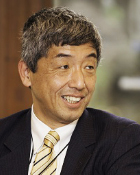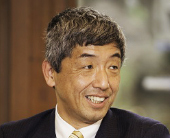Masayuki Tadokoro > Bill Emmott, Jonathan Rauch
When I discussed with Bill soon after the British referendum last summer, like many I did not think that it was likely that Trump would be the US president. I also thought Theresa May would try to work out some sort of soft-Brexit or might even deliberately sabotage Brexit by indefinitely putting off triggering the Article 50. But now with the parliament endorsement, she seems to have started the clean Brexit. It seemed to me then the most probable source of instability would come from within Europe, in particular Italy, where, as Bill rightly referred to, Matteo Renzi's actually stepped down after the referendum defeat in December. While European uncertainty is certainly there, it is now overshadowed by the election of Donald Trump. Now what I thought was a mainly British or European challenge actually turned out to be literally a global one.
How should we interpret the series of political developments both in the UK and US? We hear, the widening gap between the poor and the rich, lost social cohesion, difficulties caused by immigration, rise of social media, etc. They all sound right but we in Japan cannot help but wonder why inward-looking populism has become so powerful in the UK and the US. The two countries have for long been champions of liberal democracy, capitalism and international free trade. They have been successively hegemons of the world not only through their military and economic power, but also by “soft power” such as intellectual influences of journalism and universities that can project their ideas in English, the lingua franca today, and above all through setting an attractive model of politico-economic life. Whereas it is often irritating to be constantly lectured by Americans on how to run our politics, economy and even free press, we in Japan, like many, very much prefer living in the world run by the Anglo-American model to a Chinese or Russian empire.
Performances of the two countries, in fact, do not look bad at all. Macro economic indictors tell us the level economic well-being of both countries is generally better than other advanced economies. Neither of them is facing any existential threats from outside. Both countries are more successful in integrating new members into their societies than most. After all nothing is more American than immigration and the incumbent London Mayor is Muslim!
A theory of psychology teaches us that people tend to make a reckless decision in trying to avoid pains rather than to gain benefits. If it is the case, I find it puzzling that the Electorate in both countries selected the risky options through their legitimate democratic processes. Both British and Americans are still privileged people living wealthy and free lives among the 7 billion populations on this planet.
Talking about the democratic process, the quality and decency of the public debate during both the referendum and the presidential election was not what one would expect from the political discourses in the two countries. Yes, democracy is always a competitive and often ugly political process, but in order for it to function, we need the commitment to the basic framework of the institution, which includes minimum respect to the political opponents and agreements on basic facts, based on which the public can form their value judgment and interpretation. But, distrust by the significant portion of the public towards the mainstream media and established public intellectuals seem so intensive that “alternative facts” are widely accepted. Yet, we have been long told that both countries are best equipped in facilitating informed public decisions, free speech, free press, free discussion and availability of credible expert opinions. What happened to the mainstream press in your countries?
Perhaps I may be exaggerating. What happened in the two countries may be driven more by distinctive national contexts and occurred in the same year by coincidence. I should be, as I usually am, skeptical to the idea, “this time is different.” Americans did choose many illiberal presidents in the past, and we remember how unreasonable Americans can be on minor trade issues. Anti-immigration movements may be as American as immigration in its history and there was a time yellow journalism was more influential. The decline of America and crises of the postwar international order have been repeatedly talked about since even the 1960s. Yet, Bill, Jonathan, I cannot help wondering. Is this time different?










